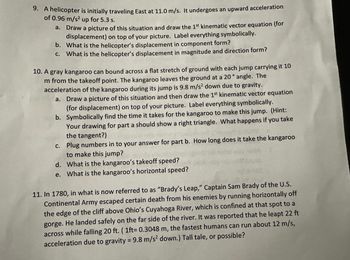
College Physics
11th Edition
ISBN: 9781305952300
Author: Raymond A. Serway, Chris Vuille
Publisher: Cengage Learning
expand_more
expand_more
format_list_bulleted
Concept explainers
Question
Asking for help on 9, 10, and 11 if possible ?

Transcribed Image Text:Certainly! Here is the transcription of the text suitable for an educational website, with explanations where necessary:
---
### Physics Problems and Exercises
#### Problem 9
A helicopter is initially traveling East at 11.0 m/s. It undergoes an upward acceleration of 0.96 m/s² for 5.3 seconds.
a. Draw a picture of this situation and draw the 1st kinematic vector equation (for displacement) on top of your picture. Label everything symbolically.
b. What is the helicopter’s displacement in component form?
c. What is the helicopter’s displacement in magnitude and direction form?
#### Problem 10
A gray kangaroo can bound across a flat stretch of ground with each jump carrying it 10 meters from the takeoff point. The kangaroo leaves the ground at a 20° angle. The acceleration of the kangaroo during its jump is 9.8 m/s² down due to gravity.
a. Draw a picture of this situation and then draw the 1st kinematic vector equation (for displacement) on top of your picture. Label everything symbolically.
b. Symbolically find the time it takes for the kangaroo to make this jump. (Hint: Your drawing for part a should show a right triangle. What happens if you take the tangent?)
c. Plug numbers into your answer for part b. How long does it take the kangaroo to make this jump?
d. What is the kangaroo’s takeoff speed?
e. What is the kangaroo’s horizontal speed?
#### Problem 11
In 1780, in what is now referred to as “Brady’s Leap,” Captain Sam Brady of the U.S. Continental Army escaped certain death from his enemies by running horizontally off the edge of the cliff above Ohio’s Cuyahoga River, which is confined at that spot to a gorge. He landed safely on the far side of the river. It was reported that he leapt 22 feet across while falling 20 ft. (1 ft = 0.3048 m). The fastest humans can run about 12 m/s, acceleration due to gravity = 9.8 m/s² down.) Tall tale, or possible?
---
### Explanation of Concepts
**1. Kinematic Vector Equations:** These are mathematical expressions used to describe motion. They are useful in predicting the future position of an object moving under constant acceleration.
**2. Component Form:** This is a way
Expert Solution
arrow_forward
Step 1: Helicopter speed and acceleration is given
Helicopter acceleration in y = 0.96m/s2
Speed in east direction = 11m/s.
Step by stepSolved in 4 steps with 1 images

Knowledge Booster
Learn more about
Need a deep-dive on the concept behind this application? Look no further. Learn more about this topic, physics and related others by exploring similar questions and additional content below.Similar questions
arrow_back_ios
SEE MORE QUESTIONS
arrow_forward_ios
Recommended textbooks for you
 College PhysicsPhysicsISBN:9781305952300Author:Raymond A. Serway, Chris VuillePublisher:Cengage Learning
College PhysicsPhysicsISBN:9781305952300Author:Raymond A. Serway, Chris VuillePublisher:Cengage Learning University Physics (14th Edition)PhysicsISBN:9780133969290Author:Hugh D. Young, Roger A. FreedmanPublisher:PEARSON
University Physics (14th Edition)PhysicsISBN:9780133969290Author:Hugh D. Young, Roger A. FreedmanPublisher:PEARSON Introduction To Quantum MechanicsPhysicsISBN:9781107189638Author:Griffiths, David J., Schroeter, Darrell F.Publisher:Cambridge University Press
Introduction To Quantum MechanicsPhysicsISBN:9781107189638Author:Griffiths, David J., Schroeter, Darrell F.Publisher:Cambridge University Press Physics for Scientists and EngineersPhysicsISBN:9781337553278Author:Raymond A. Serway, John W. JewettPublisher:Cengage Learning
Physics for Scientists and EngineersPhysicsISBN:9781337553278Author:Raymond A. Serway, John W. JewettPublisher:Cengage Learning Lecture- Tutorials for Introductory AstronomyPhysicsISBN:9780321820464Author:Edward E. Prather, Tim P. Slater, Jeff P. Adams, Gina BrissendenPublisher:Addison-Wesley
Lecture- Tutorials for Introductory AstronomyPhysicsISBN:9780321820464Author:Edward E. Prather, Tim P. Slater, Jeff P. Adams, Gina BrissendenPublisher:Addison-Wesley College Physics: A Strategic Approach (4th Editio...PhysicsISBN:9780134609034Author:Randall D. Knight (Professor Emeritus), Brian Jones, Stuart FieldPublisher:PEARSON
College Physics: A Strategic Approach (4th Editio...PhysicsISBN:9780134609034Author:Randall D. Knight (Professor Emeritus), Brian Jones, Stuart FieldPublisher:PEARSON

College Physics
Physics
ISBN:9781305952300
Author:Raymond A. Serway, Chris Vuille
Publisher:Cengage Learning

University Physics (14th Edition)
Physics
ISBN:9780133969290
Author:Hugh D. Young, Roger A. Freedman
Publisher:PEARSON

Introduction To Quantum Mechanics
Physics
ISBN:9781107189638
Author:Griffiths, David J., Schroeter, Darrell F.
Publisher:Cambridge University Press

Physics for Scientists and Engineers
Physics
ISBN:9781337553278
Author:Raymond A. Serway, John W. Jewett
Publisher:Cengage Learning

Lecture- Tutorials for Introductory Astronomy
Physics
ISBN:9780321820464
Author:Edward E. Prather, Tim P. Slater, Jeff P. Adams, Gina Brissenden
Publisher:Addison-Wesley

College Physics: A Strategic Approach (4th Editio...
Physics
ISBN:9780134609034
Author:Randall D. Knight (Professor Emeritus), Brian Jones, Stuart Field
Publisher:PEARSON